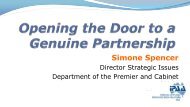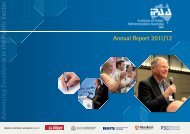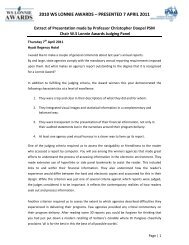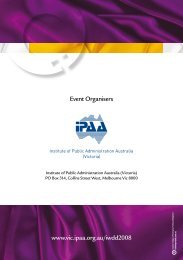Review of Victoria's integrity and anti-corruption system - IPAA Victoria
Review of Victoria's integrity and anti-corruption system - IPAA Victoria
Review of Victoria's integrity and anti-corruption system - IPAA Victoria
- No tags were found...
You also want an ePaper? Increase the reach of your titles
YUMPU automatically turns print PDFs into web optimized ePapers that Google loves.
3.1.3 publicly funded employees <strong>of</strong> members <strong>of</strong> parliamentPublicly funded employees <strong>of</strong> members <strong>of</strong> parliament include:• ministerial <strong>of</strong>ficers – pursuant to section 98 <strong>of</strong> the Public Administration Act, they provideadvice <strong>and</strong> assistance to the Premier <strong>and</strong> ministers;• parliamentary advisers – pursuant to section 99 <strong>of</strong> the Public Administration Act, they provideadvice <strong>and</strong> assistance to non-government members <strong>of</strong> parliament, including the Leader <strong>of</strong> theOpposition; <strong>and</strong>• electorate <strong>of</strong>ficers – pursuant to section 30 <strong>of</strong> the Parliamentary Administration Act 2005, theyassist members <strong>of</strong> parliament in their electorate <strong>of</strong>fices.Ministerial <strong>of</strong>ficers are a category <strong>of</strong> publicly funded staff <strong>of</strong> ministers. Under section 98 <strong>of</strong> thePublic Administration Act, ministerial <strong>of</strong>ficers are employees <strong>of</strong> the Premier. Their terms <strong>of</strong>employment are governed by employment contracts under the Ministerial Staff CollectiveAgreement 2007, which includes a Ministerial Staff Code <strong>of</strong> Conduct. Ministers or their chiefs <strong>of</strong>staff oversee the conduct <strong>of</strong> staff <strong>and</strong> any disciplinary action resulting from misconduct.Traditionally, ministerial <strong>of</strong>ficers have been considered accountable through the convention <strong>of</strong>individual ministerial responsibility, rather than subject to the same external scrutiny as publicservants. 25 However, in recent years the number <strong>of</strong> ministerial <strong>of</strong>ficers has increasedconsiderably. 26 This makes the traditional approach <strong>of</strong> ministerial accountability for the actions <strong>of</strong>their staff increasingly challenging <strong>and</strong> increases the likelihood that ministers could distancethemselves from the actions (or inactions) <strong>of</strong> their staff. It has resulted in suggestions thatministerial <strong>of</strong>ficers should be more directly subject to scrutiny. 27As ministerial <strong>of</strong>ficers, parliamentary advisers <strong>and</strong> electorate <strong>of</strong>ficers are publicly funded, the<strong>Review</strong> considers that they should be subject to external scrutiny to ensure they act with <strong>integrity</strong>.3.2 coordination between <strong>integrity</strong> bodiesThere are opportunities for <strong>Victoria</strong>’s <strong>integrity</strong> bodies to operate as a more collective <strong>and</strong> cohesive<strong>system</strong>. Fora for inter-agency coordination operate in New South Wales, Queensl<strong>and</strong>, WesternAustralia, <strong>and</strong> Tasmania. The membership <strong>of</strong> these fora comprise ombudsmen, auditors-general,heads <strong>of</strong> <strong>anti</strong>-<strong>corruption</strong> bodies, heads <strong>of</strong> police <strong>integrity</strong> bodies <strong>and</strong> public sector st<strong>and</strong>ardscommissioners. They meet regularly to ensure activities do not overlap, that matters are referredproperly <strong>and</strong> effectively between agencies <strong>and</strong> that similar language <strong>and</strong> methods are used acrossinvestigations. <strong>Review</strong> consultations indicate that these arrangements work well.In <strong>Victoria</strong>, there is currently no collective forum for <strong>integrity</strong> bodies to coordinate their activities orshare information. The <strong>Review</strong> was advised that informal communication occurs, on a one-to-onebasis. One <strong>of</strong> the current constraints on coordination is legal requirements not to share information,including:• Sections 16 F <strong>and</strong> 20 A <strong>of</strong> the Audit Act 1994 put restrictions on the sharing <strong>of</strong> informationgained during the course or conduct <strong>of</strong> an audit. There is no power in the Act to cooperate ininvestigations with other independent <strong>of</strong>ficers or other audit <strong>of</strong>fices.25Public Accounts <strong>and</strong> Estimates Committee 2010, Inquiry into <strong>Victoria</strong>’s Audit Act 1994: Discussion Paper, Parliament <strong>of</strong><strong>Victoria</strong>, Melbourne.26Strangio, P 2006, Incumbency dominance: An unhealthy trend? Papers on Parliament, no. 46, pp. 97–110.27Griffith University & Transparency International 2005, Chaos or coherence? Strengths, opportunities <strong>and</strong> challenges forAustralia’s <strong>integrity</strong> <strong>system</strong>s. National Integrity Systems Assessment Final Report, Key Centre for Ethics, Law, Justice <strong>and</strong>Governance, Griffith University & Transparency International, Australia, p. 86.14 | <strong>Review</strong> <strong>of</strong> <strong>Victoria</strong>’s <strong>integrity</strong> <strong>and</strong> <strong>anti</strong>-<strong>corruption</strong> <strong>system</strong>









